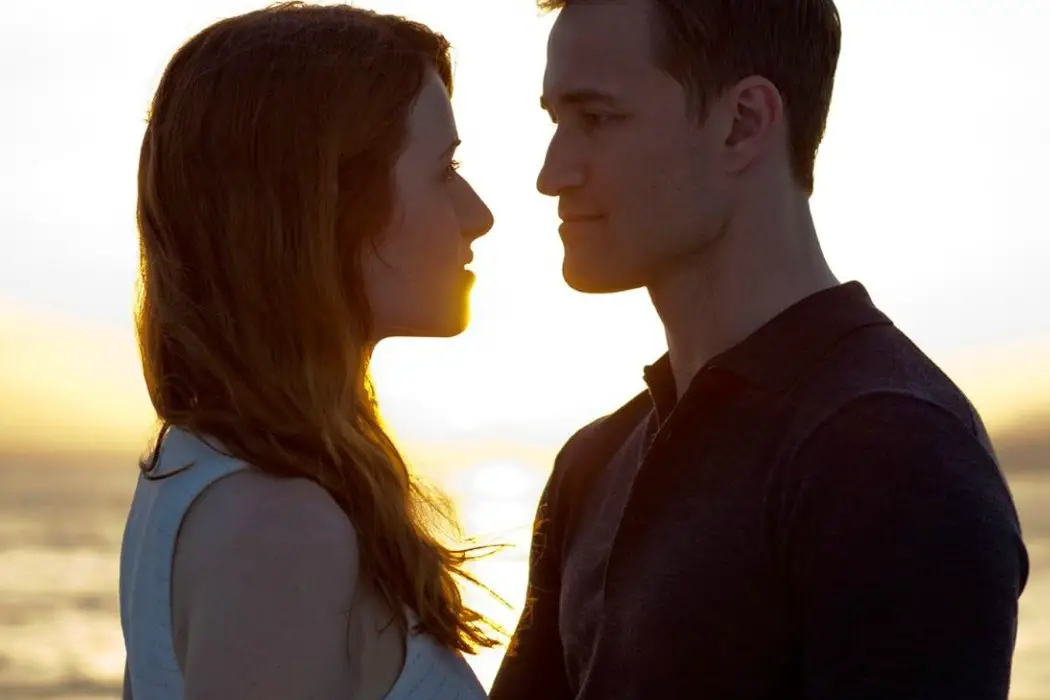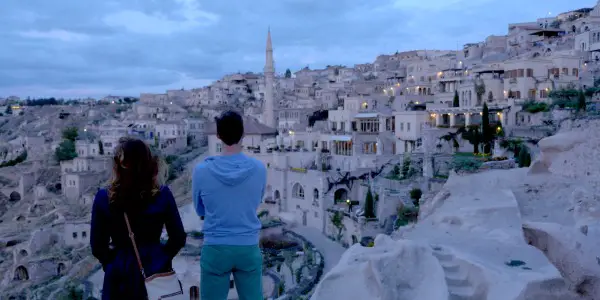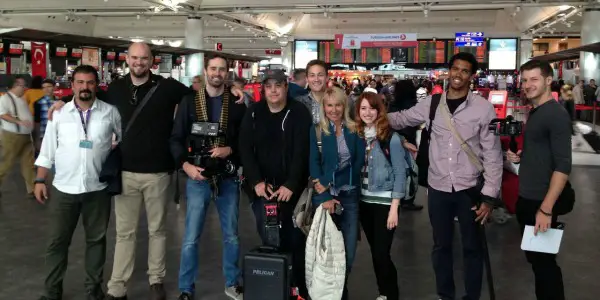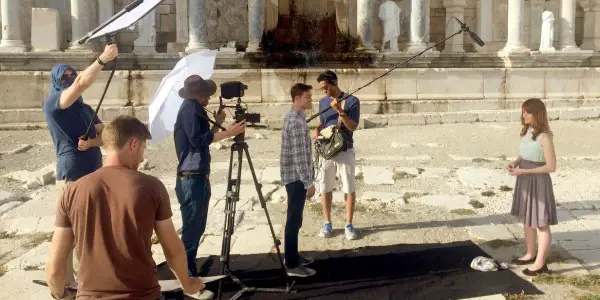Filmmaking In The Age Of Social Media: An Interview With Filmmaker Brendan Bradley

I love film, more than people probably, and I will…
The internet can be a scary place; there are too many strangers and too many unknowns to ever really trust that you’re connecting with people who are being truly honest with you. Then, the real world can be just as bad. However, the internet can also be a chaotic, exciting place, filled with endless possibilities. This is the idea behind Brendan Bradley’s first feature Non-Transferable; a film about the recently dumped Amy and her quest to find a guy, Joshua, who will use her ex-boyfriend’s non-transferable ticket to Europe.
The plot to Non-Transferable sounds kind of unbelievable until you realize how likely it is. The recently single Jordan Axani did find a travel companion this way (albeit it didn’t lead to romance) and recently a group of friends found a ‘replacement’ Joe McGrath to accompany them on their trip to Majorca. But this isn’t where Non-Transferable’s relationship with the internet ends. This is also a film produced and distributed on the kindness of the internet, and those endless possibilities I mentioned before. Funded by the Turkish Tourism board, distributed over the internet, and made by a filmmaker who has found success in online media, Non-Transferable would not have been made even a decade ago.
To add to the argument that the internet is indeed kinder than we imagine, the film’s maker Brendan Bradley found me via Rotten Tomatoes, saw that I liked romantic comedies and approached our editor. Even then it was a film I’d already heard of because the film’s lead; Ashley Clements, is the star of my favorite YouTube Series here) and through the mighty power of email, have gotten to chat with Brendan about his love of romantic comedies, the problems of producing across continents, and what this new internet age means for film production.
Julia Smith for Film Inquiry: The first thing that struck me about you is that you seem very pro romantic comedies. I am too. Forgive me but I’ve talked to so many guys who don’t like them. What draws you to the genre?
Brendan Bradley: As a child of the late 80’s and early 90’s, I was exposed to some of the greatest rom-coms in history. Like any genre picture, audiences seem to either love or hate them, but I can’t get enough of two brilliant comedians falling in love under awkward circumstances, usually against the backdrop of picture perfect vistas. These were love stories about bad timing, not bad people and usually the moral was how to survive your first big fight as a couple.
I think romantic comedies today get glossed over because in the last decade we’ve shifted to mean-spirited characters and R-rated comedy. While I enjoy those tropes, my vision with Non-Transferable was a return to the 90’s formula using today’s social media pacing and personalities.
What led you to creating this story? I’ve heard of stories, like the one in Non-Transferable, happening. What drew you to the idea of a love story created through social media?
Brendan Bradley: About seven years ago, my roommate at the time went on vacation with his girlfriend and they got into a massive fight. They were fine in the end, but it got me thinking how great a travel comedy with two strangers would be. As a creator in the digital space for the last decade, almost all my stories interact with modern technology and trends so it was a natural fit for Amy’s ‘man hunt’ to use social media. Ironically, my original script was rejected by Hollywood for being ‘too unrealistic’ but when an identical situation happened in real life and went viral in 2014, my script got renewed interest.

Have you written much before? How big of a task was it to take on a feature script? I’m thinking you probably had to write this while still pursuing acting roles etc.?
Brendan Bradley: Many of my role models are known for writing on the side and creating their own opportunities; Gene Wilder, Emma Thompson, Ed Burns, etc. so it always seemed like part of the job. Over the last decade, I’ve written three digital series, four television specs, two and a half feature films and several sketches. I am constantly ‘writing’ between auditions, projects, and day jobs – which often means doing research and collecting snapshots of action and dialogue until the characters literally start talking in my head. Then I turn into a combination of a stenographer and a schizophrenic until the first draft is complete.
How exactly did you get the Turkish tourism board to help fund the film? I notice that Turkish Airlines is also a supporter of the film?
Brendan Bradley: This is probably the craziest part of Non-Transferable. Like the lead character in the movie, I just contacted tourism boards using social media. Non-Transferable began with a crazy idea that we could use the ‘sharing economy’ to produce an international love story. I filmed the first twenty minutes as a proof-of-concept and then contacted dozens of tourism boards online with the idea to host our team to finish the film featuring their country’s travel brands and destinations.
And why Turkey?
Brendan Bradley: Several countries were interested, however Turkey was the only one that had a national airline which would cover the cost of flying the cast and crew overseas. So ultimately we chose Turkey because it offered an all inclusive ‘vacation package to make a movie’. Our hosts at VIP Travel really understood and supported the spirit of ‘diplomacy through cinema’ and helped with every single detail including travel, accommodations, crew, meals and equipment.
You and Ashley both worked for Pemberley Digital, did its influence impact on the way you produced and distributed Non-Transferable?
Brendan Bradley: Pemberley Digital is one of the many online companies I’ve collaborated with, but the real lessons for Non-Transferable came from my work on other independent films and reading Anita Elberse’s book Blockbusters, about the economics of film distribution and partnerships. Ashley is known for Pemberley’s Emmy-Award winning production of The Lizzie Bennet Diaries, but what a lot of people don’t know is that Ashley carried that franchise by filming over 70 pages per day, mostly in monologues!
Watching her work in that show heavily influenced my decision to trust her to carry my first film with a demanding shooting schedule, ambitious physical comedy, rapid dialogue and even co-Producing with me overseas. I think she’s the next Amy Adams or Tina Fey and I hope Non-Transferable can be a vehicle to give her the attention she deserves.
Brendan Bradley: I presumed that you and Ashley met through your work with Pemberley Digital, did you guys know each other outside of this?
We like to say we were on ‘one-arm hug status’ from working in the web, but didn’t really know each other until we filmed a web-series called Muzzled The Musical. I emailed her a draft of Non-Transferable after she told me she was from the Bay Area and was passionate about travel.
Brendan Bradley: And what did you go through in the decision to cast yourself in the lead? That’s a lot of work for one person, to produce, write, direct and act in one movie.
I’ve been producing since I was a teenager, almost exclusively to create opportunities for myself as an actor. While wearing many hats can be exhausting and limiting, knowing I get to step in front of the camera helps me push through the herculean demands of independent storytelling. I simply love being on set and I think when the rest of the crew sees how seriously I take the work and my unyielding passion, it gives everyone else permission to take ownership of their piece of the project

What was the production like? Was it intimidating, working on your first feature, and in another country to boot?
Brendan Bradley: Making this movie is that hardest I’ve ever worked in my entire life and it was a marathon for two years. Making online shorts first certainly helped. Joseph Gordon-Levitt says it’s like “building a birdhouse before you build a skyscraper.” But it all comes down to trusting your team. I believe in collaboration and our filming and travel schedule across three continents would not have been possible without the incredible efforts of our cast, crew and partners.
We really lucked out with Turkish Airlines, VIP and the Ministry of Tourism who supported my vision and allowed me to focus on the filmmaking process while they took care of flights, hotels, meals… even helping us replace a drone camera when we had an accident! For me and the crew, Non-Transferable was a true work-vacation. We worked so hard to make the movie, we rarely got to stop and appreciate the experience. Each time I watch Non-Transferable now, I get to sit back and enjoy all the amazing adventures and hilarious stories from making the film on location.
The Turkish tourism board really got behind you, which is fantastic. But I imagine it being kind of stressful putting so much of a film’s foundations in the hands of a country halfway around the world. Did you find it easy to trust them with their end of the production?
Brendan Bradley: I admit I’m a bit of a micromanager so it was scary to give up some control and be somewhat vulnerable to sight unseen locations, resources and circumstances. But I don’t believe that’s unique to our film as most independent filmmakers cannot control all the elements, and rely on a certain amount of serendipity. I found the most important tool was putting in the work during pre-production.
I spent months scouting locations using Google Earth; researching and purchasing items that would appear on screen; watching as many camera tests and international films as I could get my hands on to clearly outline the storyboards and technical vocabulary for our team, even rehearsing the scenes as much as possible in the US before we went overseas. There were constant surprises and lessons but, for the most part, everyone played to their strengths with my trusting the team to get the shot, the sponsors to handle the travel, and Ashley to live with me in the moment to capture as much useable footage as possible.
Was it always the intention to only set the film in Turkey or would you have liked to take Amy and Josh further through Europe?
Brendan Bradley: I originally imagined the characters traveling across several countries for variety, but when I learned about Turkey’s beautifully diverse regions and landscapes, I knew there was no question we had to film there. We woke up our first morning and out our window we could see the Aegean Sea. We began on the northwest coast driving through olive groves in Bademli-İzmir and shopping the cobblestone markets of Ayvalik.
Then we drove to Ephesus to film in the largest collection of Roman ruins. Afterward we visited the snow-white travertines in Pammukkale and the awe-inspiring fountain in Burdur-Sagalassos. Followed by a week of yachting off the coastal resorts in Datca. Then we stopped in Cappadocia to see sunrise balloon rides and fairy chimneys. Finally, we completed our filming in Istanbul, exploring the stunning landmarks near the Bosphorus before catching our flight from the CIP Lounge at Ataturk Airport.
The cinematography in this film is incredible. Did you and Davidson (Vorhes, the film’s cinematographer) have many discussions about how you wanted the film to look?
Brendan Bradley: Absolutely! All the credit goes to both our cinematographers Davidson Vorhes and Jared Hoy. I’ve worked with both Davidson and Jared on web-series’ in the past and we had many conversations about the look and feel of the picture. In a lot of ways, I wanted the journey of Non-Transferable to actually bridge our style and audience from web to cinema.
The first act is filmed more like a web-series with hyper-paced close ups in low-fi offices, apartments and bars. As we travel overseas, the entire production literally ‘opens up’ to capture more wide, cinematic shots that breathe with increasingly ambitious camera movements and drone shots. Davidson and I created our own shorthand like ‘Close Up 2.0’ so that we could communicate the difference even when I was on camera and couldn’t look at the monitor.

I was really impressed with the way you wrote the female parts. Not that there aren’t many great male screenwriters who can write women, but it’s not uncommon to see many misread how women behave. Is this writing something that came naturally to you?
Brendan Bradley: Thank you so much as I genuinely believe that is the highest compliment in the world! I think it’s because, as an actor, I internalize and ‘act out’ every role as I’m writing. I never approach the story like, ‘what would a woman do here’ but instead always ask, ‘if I was playing this character, what would I do next?’. During production, I give my cast a lot of ownership of their dialogue and arc which allows my ‘voice’ to inform, not limit the character.
I have to ask, the women in this movie are pretty covered up and you seemed quite relaxed about revealing yourself to the camera. I don’t want to cast aspersions against your sex but it feels unusual to see a male director so at ease with putting himself under the spotlight like this. Was there any reasoning behind this when you were writing the film, or was it just what you felt was required of the scenes?
Brendan Bradley: I took a page from Jason Segel’s book that if I was going to ask someone to get undressed, it might as well be me. When I was writing these scenes I honestly followed the comedy to its broadest conclusion. Amy is a more ‘buttoned up’ character so it would feel forced and gratuitous to undress her. Meanwhile, Joshua is our wild child so it feels organic to comedically compromise him. In honouring the 90’s romcom format, there is a lot of sexualizing male characters with on screen nudity while female characters are usually sexualized using fashion and implied nudity. I think audiences are comfortable as long as it serves the story.
How much work have you had to put in to getting this distributed? I feel like this whole production has been a labour of love for you.
Brendan Bradley: For a guy who’s used to clicking the upload button, formal distribution was certainly eye opening, to say the least. An entire year was spent at meetings, festivals, film markets and post production houses to navigate the process of delivering and distributing a feature film worldwide. Throughout the process we experienced set backs ranging from technical errors to union restrictions, to a government coup d’eat in our host country! Amidst this process, I was still working and auditioning for other projects in order to afford this learning curve. Non-Transferable was absolutely a labor of love for each and every team member who put in hundreds of hours of sweat equity to finish the film.
What do you see your future being now? Now you’ve seen how a film can be made, will you be making a new feature soon?
Brendan Bradley: The distribution process made me crave getting back to the fun part of ‘making’ a film. I’ve already begun writing and discussing other projects using the model and lessons from Non-Transferable, while also giving myself a much needed break to re-establish a healthier lifestyle so I don’t collapse before we can film the next project. Suffice to say, I’m listening to my mother and eating and sleeping more regularly.
You mentioned before about maybe working with another tourism board, is this something you’re seriously considering? If so, is there a country you’d love to film in?
Brendan Bradley: Absolutely! Before we completed Non-Transferable, other tourism boards expressed interest in our process and we’re just looking for the right balance for our partners and story to serve everyone’s needs. So far we’ve spoken with destinations like Fiji, France, Panama and Abu Dhabi. However, I have previously acted in a short film in Wales when I was at RADA, so if your readers would like to host us, we’d be very interested…
You went to RADA? That’s pretty impressive, when were you in the UK? Also when and where were you in Wales? I don’t mean to brag but we have some lovely scenery around here. Perfect romantic comedy country.
Brendan Bradley: I went to RADA through a temporary Shakespeare Certificate program in 2004. I filmed a short film in Cardiff during my spring break. You’re right it is gorgeous and I’d welcome the opportunity to return!
Making a film about social media and in an age where we rely on it so heavily makes me wonder what your feelings are towards it. Are you someone who sees its endless possibilities or, as you’re in the public eye, do you feel guarded against it?
Brendan Bradley: I see social media like any other productivity tool. A keyboard does not make you a writer. A camera does not make you a cinematographer. Social media offers powerful possibilities to connect and share ideas and information, but its potential relies completely on the talent and intentions of the people using the tool. As a performer, I equally enjoy and dread the expectation to self-promote online but have always been somewhat aware that social media is a professional, not personal, outlet.
In the epidemic of content, I think we’re starting to see the advantages of proper incubation and curation for both artistic and personal expression. Non-Transferable is a great lesson in online networking to create an offline international collaboration, that later shares the final product with a combined online following. After all, because of social media I’m grateful for the opportunity to talk to you today!
Non-Transferable is available on iTunes in the US and you can follow the film on Twitter @NonTransferFilm for further information about global release dates, while Brendan can be found on Twitter @brendanAbradley.
You can watch Ashley in The Lizzie Bennet Diaries & Brendan in Frankenstein, MD via Pemberley Digital’s YouTube channel, and together in Muzzled The Musical’s YouTube videos.
Does content like this matter to you?
Become a Member and support film journalism. Unlock access to all of Film Inquiry`s great articles. Join a community of like-minded readers who are passionate about cinema - get access to our private members Network, give back to independent filmmakers, and more.
I love film, more than people probably, and I will watch pretty much anything. Seriously, anything! I have a postgraduate education in film & have spent an exceptionally long time trying to get inside the film industry. I'm a big believer in treating every film the same, and bringing something new to the film theory table, giving reasons for every argument made. You'll find that I'm an empathetic and fun sort of reviewer, at least, I like to think so. If I'm not watching films I'm doing exceptionally nerdy stuff, like watching documentaries about the history of medicine and collecting photos of old post boxes.













